Report on UK Health Services: Public, Private, NHS, and Legislation
VerifiedAdded on 2023/06/17
|8
|2359
|464
Report
AI Summary
This report provides an overview of the UK's health and health services, focusing on the publicly funded National Health Service (NHS) and private healthcare options. It examines the arguments for and against both public and private healthcare, highlighting the NHS's principles of universality and free access, while also acknowledging concerns about costs, ethical issues, and waiting times. The report also discusses contemporary health issues, such as cardiovascular illness, depression, and obesity, and outlines key legislation, including the Health and Social Care Act 2012 and the NHS 10 Year Plan, aimed at improving healthcare quality and reducing disparities. It concludes that a high-quality healthcare system is essential for preventing illness and enhancing the quality of life, emphasizing the importance of effective communication among healthcare professionals. Desklib offers a wide range of study resources, including past papers and solved assignments, to support students in their academic endeavors.
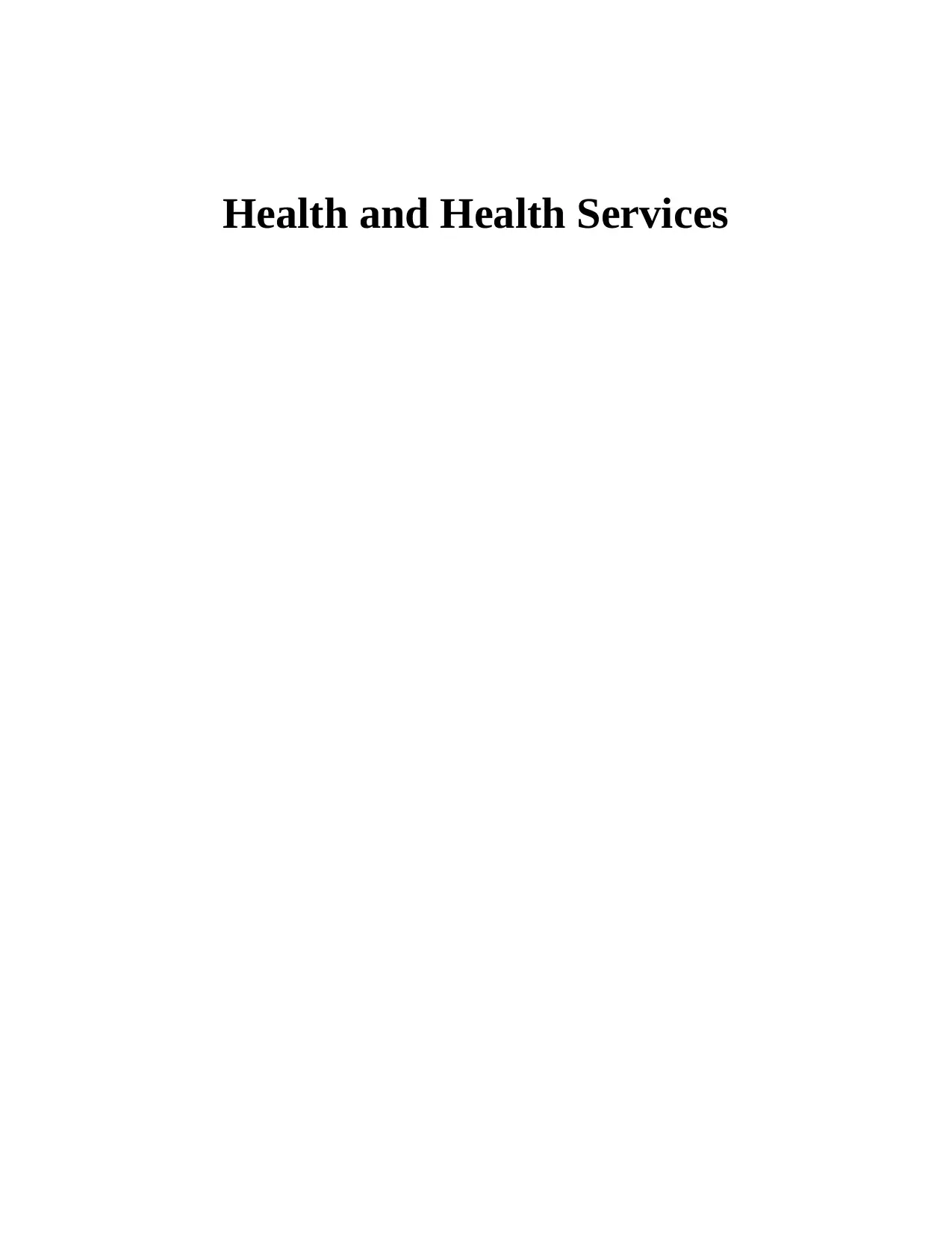
Health and Health Services
Paraphrase This Document
Need a fresh take? Get an instant paraphrase of this document with our AI Paraphraser
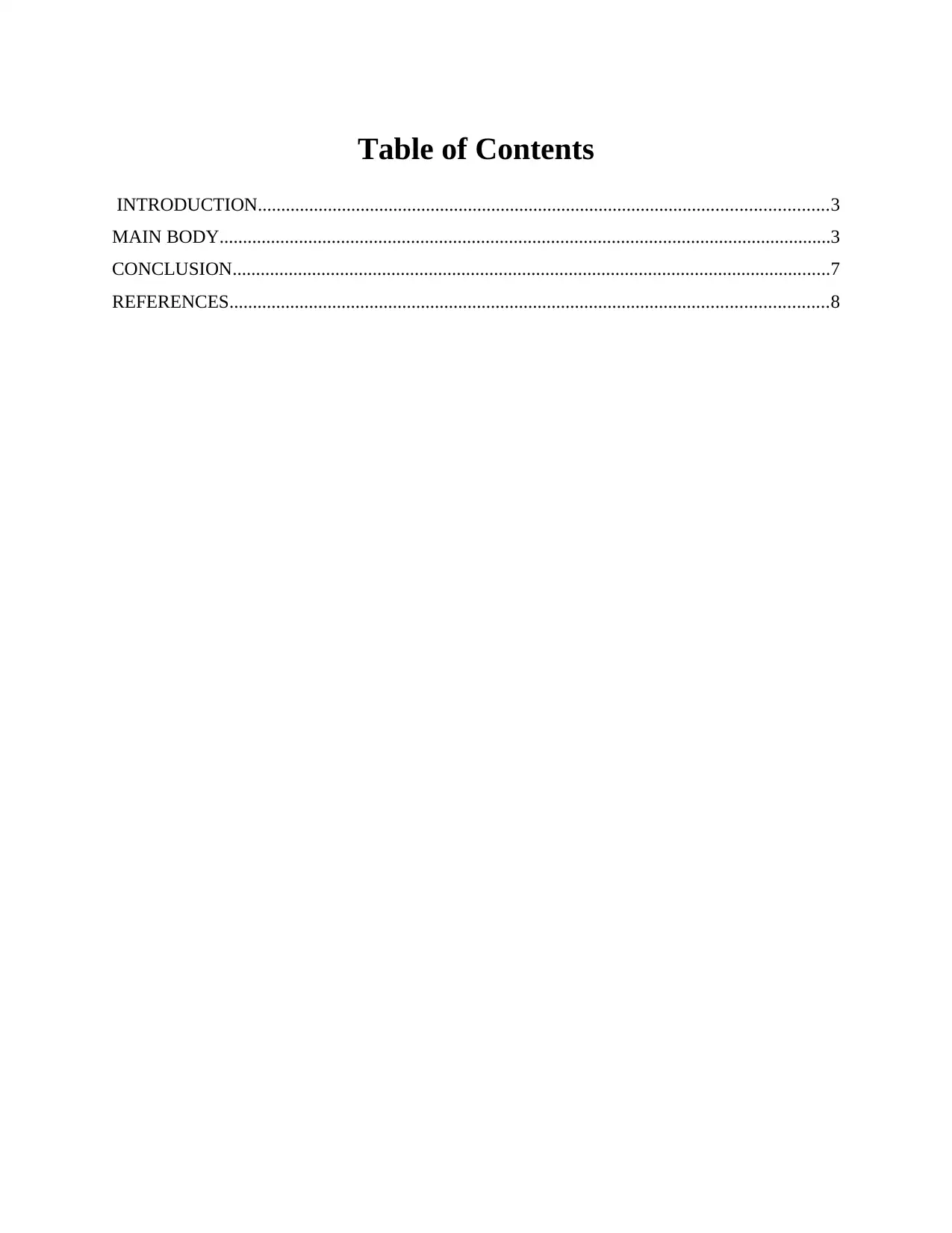
Table of Contents
INTRODUCTION..........................................................................................................................3
MAIN BODY...................................................................................................................................3
CONCLUSION................................................................................................................................7
REFERENCES................................................................................................................................8
INTRODUCTION..........................................................................................................................3
MAIN BODY...................................................................................................................................3
CONCLUSION................................................................................................................................7
REFERENCES................................................................................................................................8
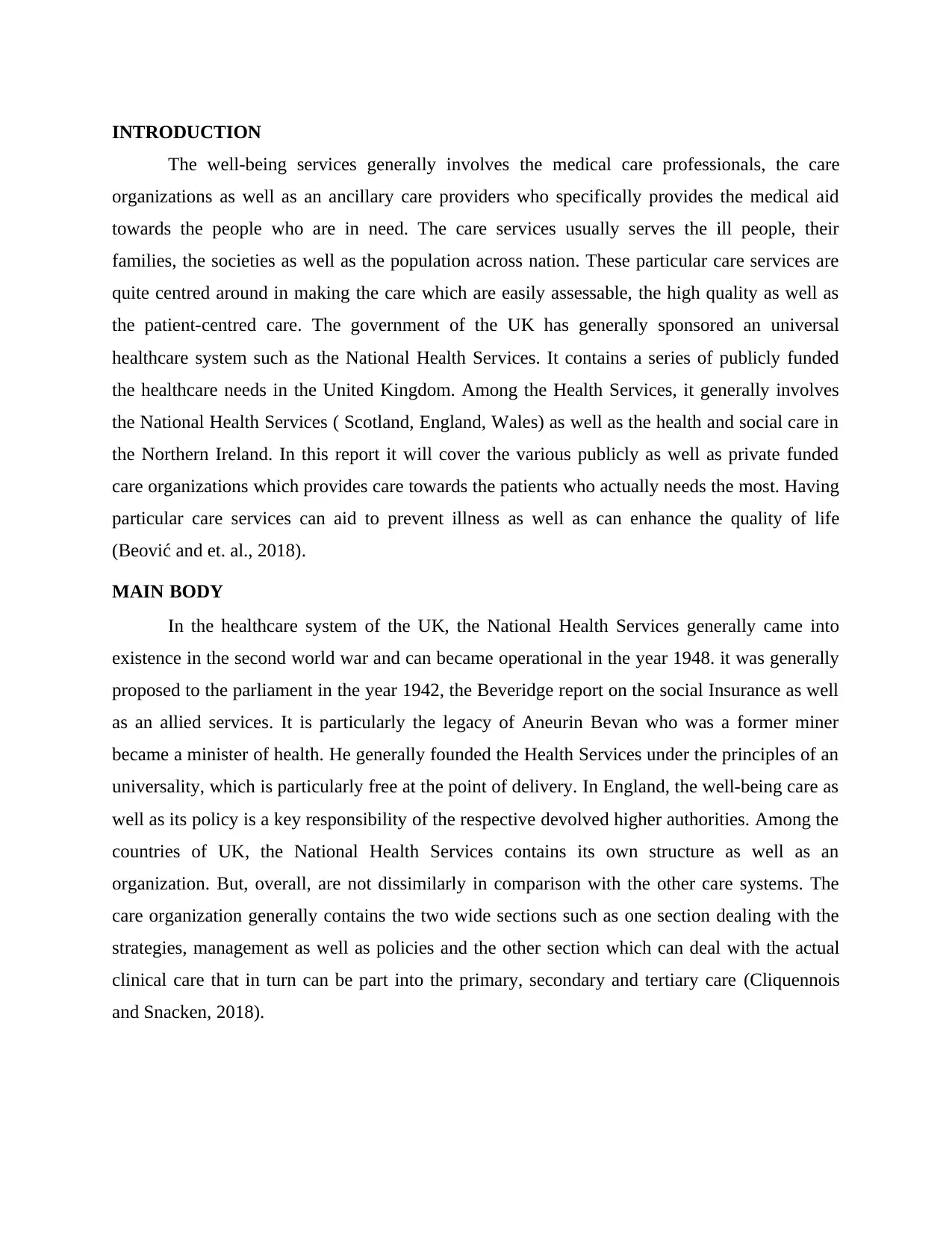
INTRODUCTION
The well-being services generally involves the medical care professionals, the care
organizations as well as an ancillary care providers who specifically provides the medical aid
towards the people who are in need. The care services usually serves the ill people, their
families, the societies as well as the population across nation. These particular care services are
quite centred around in making the care which are easily assessable, the high quality as well as
the patient-centred care. The government of the UK has generally sponsored an universal
healthcare system such as the National Health Services. It contains a series of publicly funded
the healthcare needs in the United Kingdom. Among the Health Services, it generally involves
the National Health Services ( Scotland, England, Wales) as well as the health and social care in
the Northern Ireland. In this report it will cover the various publicly as well as private funded
care organizations which provides care towards the patients who actually needs the most. Having
particular care services can aid to prevent illness as well as can enhance the quality of life
(Beović and et. al., 2018).
MAIN BODY
In the healthcare system of the UK, the National Health Services generally came into
existence in the second world war and can became operational in the year 1948. it was generally
proposed to the parliament in the year 1942, the Beveridge report on the social Insurance as well
as an allied services. It is particularly the legacy of Aneurin Bevan who was a former miner
became a minister of health. He generally founded the Health Services under the principles of an
universality, which is particularly free at the point of delivery. In England, the well-being care as
well as its policy is a key responsibility of the respective devolved higher authorities. Among the
countries of UK, the National Health Services contains its own structure as well as an
organization. But, overall, are not dissimilarly in comparison with the other care systems. The
care organization generally contains the two wide sections such as one section dealing with the
strategies, management as well as policies and the other section which can deal with the actual
clinical care that in turn can be part into the primary, secondary and tertiary care (Cliquennois
and Snacken, 2018).
The well-being services generally involves the medical care professionals, the care
organizations as well as an ancillary care providers who specifically provides the medical aid
towards the people who are in need. The care services usually serves the ill people, their
families, the societies as well as the population across nation. These particular care services are
quite centred around in making the care which are easily assessable, the high quality as well as
the patient-centred care. The government of the UK has generally sponsored an universal
healthcare system such as the National Health Services. It contains a series of publicly funded
the healthcare needs in the United Kingdom. Among the Health Services, it generally involves
the National Health Services ( Scotland, England, Wales) as well as the health and social care in
the Northern Ireland. In this report it will cover the various publicly as well as private funded
care organizations which provides care towards the patients who actually needs the most. Having
particular care services can aid to prevent illness as well as can enhance the quality of life
(Beović and et. al., 2018).
MAIN BODY
In the healthcare system of the UK, the National Health Services generally came into
existence in the second world war and can became operational in the year 1948. it was generally
proposed to the parliament in the year 1942, the Beveridge report on the social Insurance as well
as an allied services. It is particularly the legacy of Aneurin Bevan who was a former miner
became a minister of health. He generally founded the Health Services under the principles of an
universality, which is particularly free at the point of delivery. In England, the well-being care as
well as its policy is a key responsibility of the respective devolved higher authorities. Among the
countries of UK, the National Health Services contains its own structure as well as an
organization. But, overall, are not dissimilarly in comparison with the other care systems. The
care organization generally contains the two wide sections such as one section dealing with the
strategies, management as well as policies and the other section which can deal with the actual
clinical care that in turn can be part into the primary, secondary and tertiary care (Cliquennois
and Snacken, 2018).
⊘ This is a preview!⊘
Do you want full access?
Subscribe today to unlock all pages.

Trusted by 1+ million students worldwide
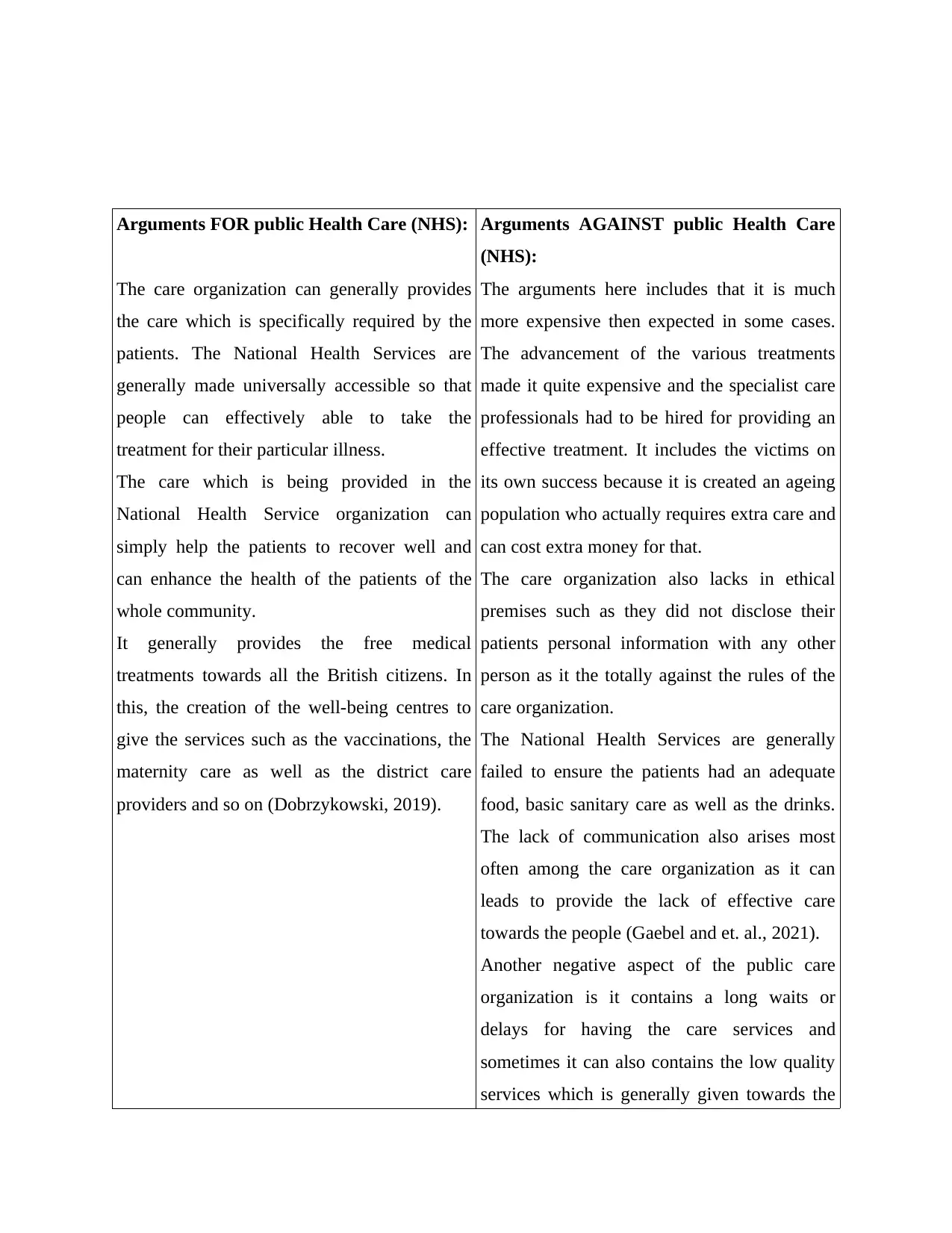
Arguments FOR public Health Care (NHS):
The care organization can generally provides
the care which is specifically required by the
patients. The National Health Services are
generally made universally accessible so that
people can effectively able to take the
treatment for their particular illness.
The care which is being provided in the
National Health Service organization can
simply help the patients to recover well and
can enhance the health of the patients of the
whole community.
It generally provides the free medical
treatments towards all the British citizens. In
this, the creation of the well-being centres to
give the services such as the vaccinations, the
maternity care as well as the district care
providers and so on (Dobrzykowski, 2019).
Arguments AGAINST public Health Care
(NHS):
The arguments here includes that it is much
more expensive then expected in some cases.
The advancement of the various treatments
made it quite expensive and the specialist care
professionals had to be hired for providing an
effective treatment. It includes the victims on
its own success because it is created an ageing
population who actually requires extra care and
can cost extra money for that.
The care organization also lacks in ethical
premises such as they did not disclose their
patients personal information with any other
person as it the totally against the rules of the
care organization.
The National Health Services are generally
failed to ensure the patients had an adequate
food, basic sanitary care as well as the drinks.
The lack of communication also arises most
often among the care organization as it can
leads to provide the lack of effective care
towards the people (Gaebel and et. al., 2021).
Another negative aspect of the public care
organization is it contains a long waits or
delays for having the care services and
sometimes it can also contains the low quality
services which is generally given towards the
The care organization can generally provides
the care which is specifically required by the
patients. The National Health Services are
generally made universally accessible so that
people can effectively able to take the
treatment for their particular illness.
The care which is being provided in the
National Health Service organization can
simply help the patients to recover well and
can enhance the health of the patients of the
whole community.
It generally provides the free medical
treatments towards all the British citizens. In
this, the creation of the well-being centres to
give the services such as the vaccinations, the
maternity care as well as the district care
providers and so on (Dobrzykowski, 2019).
Arguments AGAINST public Health Care
(NHS):
The arguments here includes that it is much
more expensive then expected in some cases.
The advancement of the various treatments
made it quite expensive and the specialist care
professionals had to be hired for providing an
effective treatment. It includes the victims on
its own success because it is created an ageing
population who actually requires extra care and
can cost extra money for that.
The care organization also lacks in ethical
premises such as they did not disclose their
patients personal information with any other
person as it the totally against the rules of the
care organization.
The National Health Services are generally
failed to ensure the patients had an adequate
food, basic sanitary care as well as the drinks.
The lack of communication also arises most
often among the care organization as it can
leads to provide the lack of effective care
towards the people (Gaebel and et. al., 2021).
Another negative aspect of the public care
organization is it contains a long waits or
delays for having the care services and
sometimes it can also contains the low quality
services which is generally given towards the
Paraphrase This Document
Need a fresh take? Get an instant paraphrase of this document with our AI Paraphraser
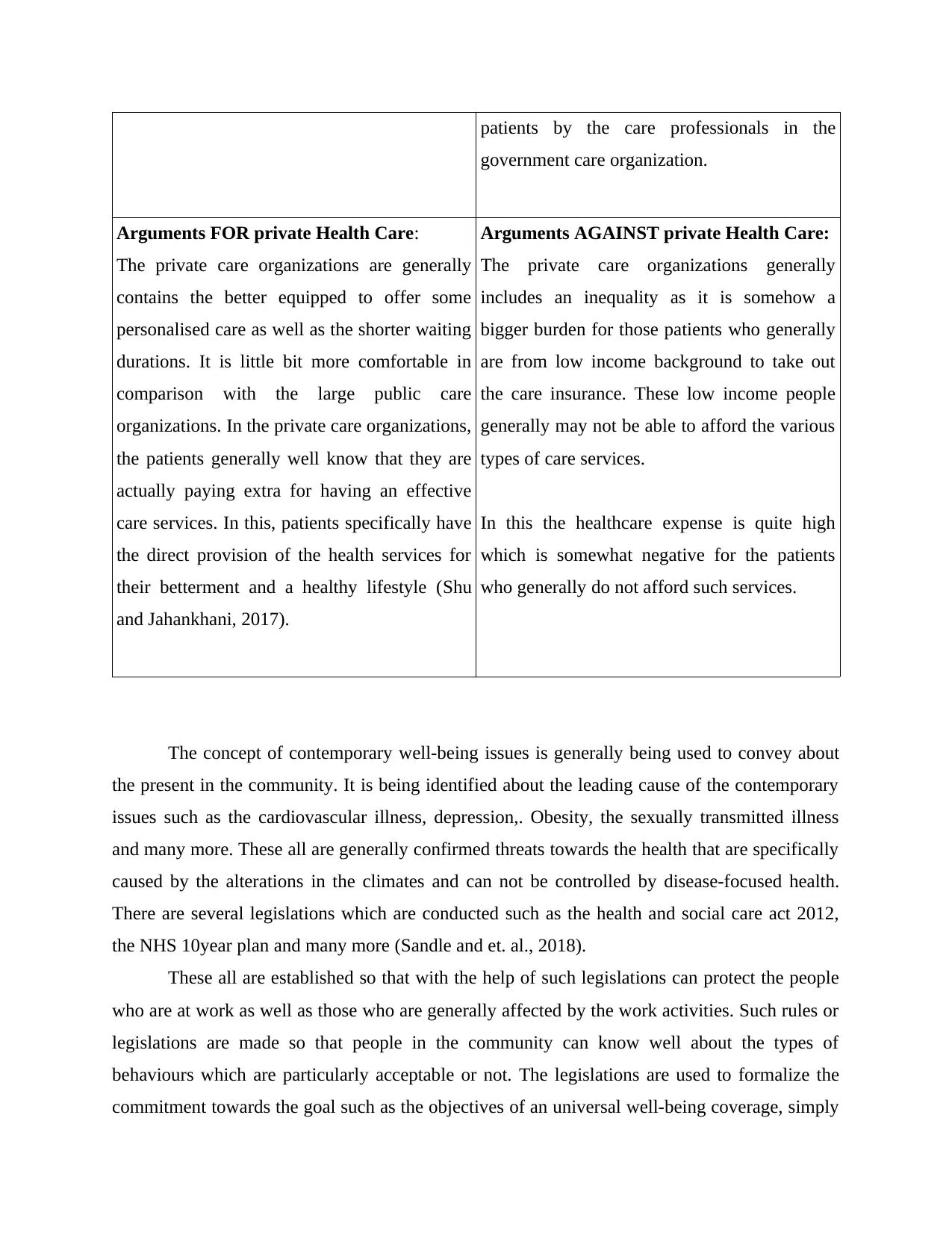
patients by the care professionals in the
government care organization.
Arguments FOR private Health Care:
The private care organizations are generally
contains the better equipped to offer some
personalised care as well as the shorter waiting
durations. It is little bit more comfortable in
comparison with the large public care
organizations. In the private care organizations,
the patients generally well know that they are
actually paying extra for having an effective
care services. In this, patients specifically have
the direct provision of the health services for
their betterment and a healthy lifestyle (Shu
and Jahankhani, 2017).
Arguments AGAINST private Health Care:
The private care organizations generally
includes an inequality as it is somehow a
bigger burden for those patients who generally
are from low income background to take out
the care insurance. These low income people
generally may not be able to afford the various
types of care services.
In this the healthcare expense is quite high
which is somewhat negative for the patients
who generally do not afford such services.
The concept of contemporary well-being issues is generally being used to convey about
the present in the community. It is being identified about the leading cause of the contemporary
issues such as the cardiovascular illness, depression,. Obesity, the sexually transmitted illness
and many more. These all are generally confirmed threats towards the health that are specifically
caused by the alterations in the climates and can not be controlled by disease-focused health.
There are several legislations which are conducted such as the health and social care act 2012,
the NHS 10year plan and many more (Sandle and et. al., 2018).
These all are established so that with the help of such legislations can protect the people
who are at work as well as those who are generally affected by the work activities. Such rules or
legislations are made so that people in the community can know well about the types of
behaviours which are particularly acceptable or not. The legislations are used to formalize the
commitment towards the goal such as the objectives of an universal well-being coverage, simply
government care organization.
Arguments FOR private Health Care:
The private care organizations are generally
contains the better equipped to offer some
personalised care as well as the shorter waiting
durations. It is little bit more comfortable in
comparison with the large public care
organizations. In the private care organizations,
the patients generally well know that they are
actually paying extra for having an effective
care services. In this, patients specifically have
the direct provision of the health services for
their betterment and a healthy lifestyle (Shu
and Jahankhani, 2017).
Arguments AGAINST private Health Care:
The private care organizations generally
includes an inequality as it is somehow a
bigger burden for those patients who generally
are from low income background to take out
the care insurance. These low income people
generally may not be able to afford the various
types of care services.
In this the healthcare expense is quite high
which is somewhat negative for the patients
who generally do not afford such services.
The concept of contemporary well-being issues is generally being used to convey about
the present in the community. It is being identified about the leading cause of the contemporary
issues such as the cardiovascular illness, depression,. Obesity, the sexually transmitted illness
and many more. These all are generally confirmed threats towards the health that are specifically
caused by the alterations in the climates and can not be controlled by disease-focused health.
There are several legislations which are conducted such as the health and social care act 2012,
the NHS 10year plan and many more (Sandle and et. al., 2018).
These all are established so that with the help of such legislations can protect the people
who are at work as well as those who are generally affected by the work activities. Such rules or
legislations are made so that people in the community can know well about the types of
behaviours which are particularly acceptable or not. The legislations are used to formalize the
commitment towards the goal such as the objectives of an universal well-being coverage, simply
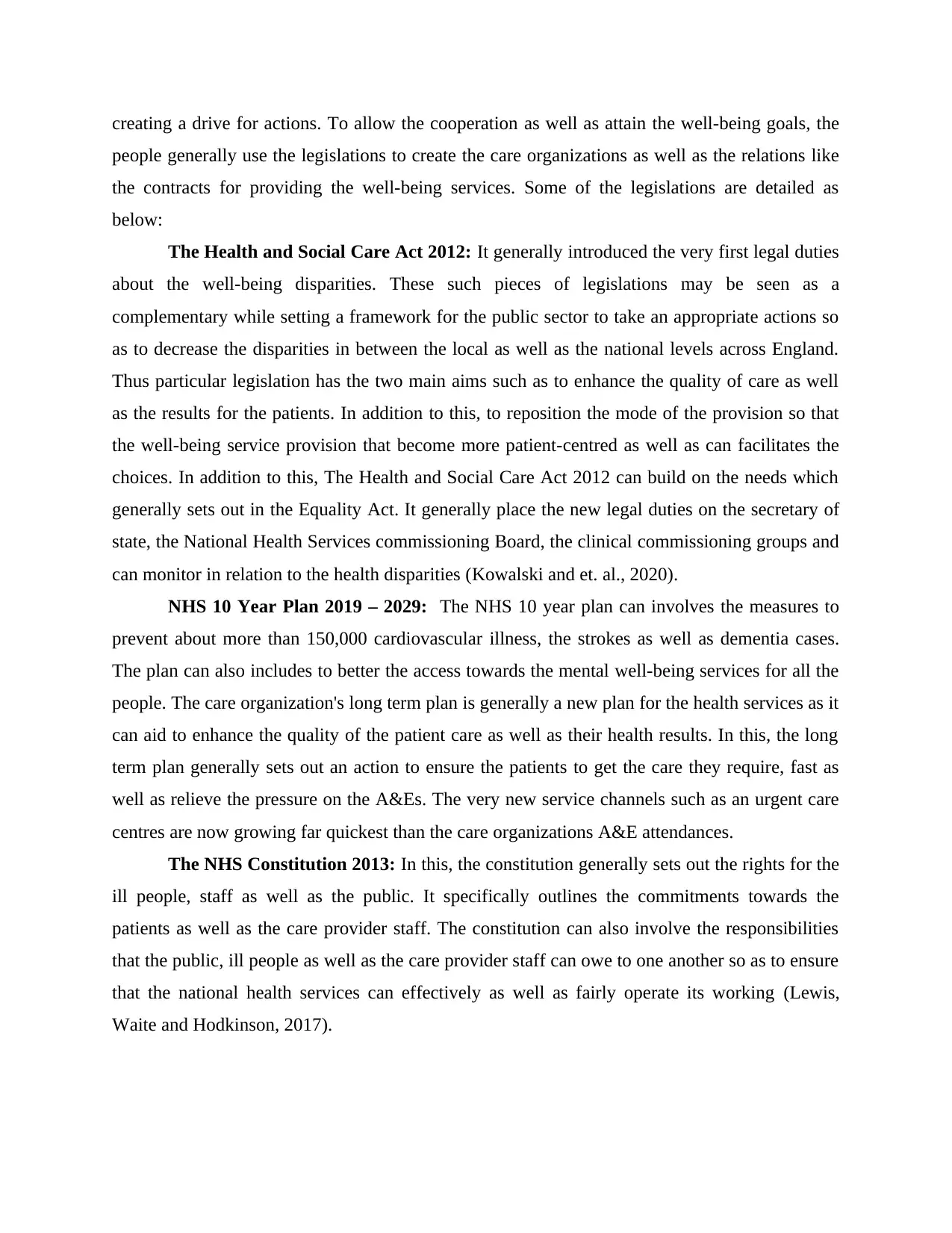
creating a drive for actions. To allow the cooperation as well as attain the well-being goals, the
people generally use the legislations to create the care organizations as well as the relations like
the contracts for providing the well-being services. Some of the legislations are detailed as
below:
The Health and Social Care Act 2012: It generally introduced the very first legal duties
about the well-being disparities. These such pieces of legislations may be seen as a
complementary while setting a framework for the public sector to take an appropriate actions so
as to decrease the disparities in between the local as well as the national levels across England.
Thus particular legislation has the two main aims such as to enhance the quality of care as well
as the results for the patients. In addition to this, to reposition the mode of the provision so that
the well-being service provision that become more patient-centred as well as can facilitates the
choices. In addition to this, The Health and Social Care Act 2012 can build on the needs which
generally sets out in the Equality Act. It generally place the new legal duties on the secretary of
state, the National Health Services commissioning Board, the clinical commissioning groups and
can monitor in relation to the health disparities (Kowalski and et. al., 2020).
NHS 10 Year Plan 2019 – 2029: The NHS 10 year plan can involves the measures to
prevent about more than 150,000 cardiovascular illness, the strokes as well as dementia cases.
The plan can also includes to better the access towards the mental well-being services for all the
people. The care organization's long term plan is generally a new plan for the health services as it
can aid to enhance the quality of the patient care as well as their health results. In this, the long
term plan generally sets out an action to ensure the patients to get the care they require, fast as
well as relieve the pressure on the A&Es. The very new service channels such as an urgent care
centres are now growing far quickest than the care organizations A&E attendances.
The NHS Constitution 2013: In this, the constitution generally sets out the rights for the
ill people, staff as well as the public. It specifically outlines the commitments towards the
patients as well as the care provider staff. The constitution can also involve the responsibilities
that the public, ill people as well as the care provider staff can owe to one another so as to ensure
that the national health services can effectively as well as fairly operate its working (Lewis,
Waite and Hodkinson, 2017).
people generally use the legislations to create the care organizations as well as the relations like
the contracts for providing the well-being services. Some of the legislations are detailed as
below:
The Health and Social Care Act 2012: It generally introduced the very first legal duties
about the well-being disparities. These such pieces of legislations may be seen as a
complementary while setting a framework for the public sector to take an appropriate actions so
as to decrease the disparities in between the local as well as the national levels across England.
Thus particular legislation has the two main aims such as to enhance the quality of care as well
as the results for the patients. In addition to this, to reposition the mode of the provision so that
the well-being service provision that become more patient-centred as well as can facilitates the
choices. In addition to this, The Health and Social Care Act 2012 can build on the needs which
generally sets out in the Equality Act. It generally place the new legal duties on the secretary of
state, the National Health Services commissioning Board, the clinical commissioning groups and
can monitor in relation to the health disparities (Kowalski and et. al., 2020).
NHS 10 Year Plan 2019 – 2029: The NHS 10 year plan can involves the measures to
prevent about more than 150,000 cardiovascular illness, the strokes as well as dementia cases.
The plan can also includes to better the access towards the mental well-being services for all the
people. The care organization's long term plan is generally a new plan for the health services as it
can aid to enhance the quality of the patient care as well as their health results. In this, the long
term plan generally sets out an action to ensure the patients to get the care they require, fast as
well as relieve the pressure on the A&Es. The very new service channels such as an urgent care
centres are now growing far quickest than the care organizations A&E attendances.
The NHS Constitution 2013: In this, the constitution generally sets out the rights for the
ill people, staff as well as the public. It specifically outlines the commitments towards the
patients as well as the care provider staff. The constitution can also involve the responsibilities
that the public, ill people as well as the care provider staff can owe to one another so as to ensure
that the national health services can effectively as well as fairly operate its working (Lewis,
Waite and Hodkinson, 2017).
⊘ This is a preview!⊘
Do you want full access?
Subscribe today to unlock all pages.

Trusted by 1+ million students worldwide
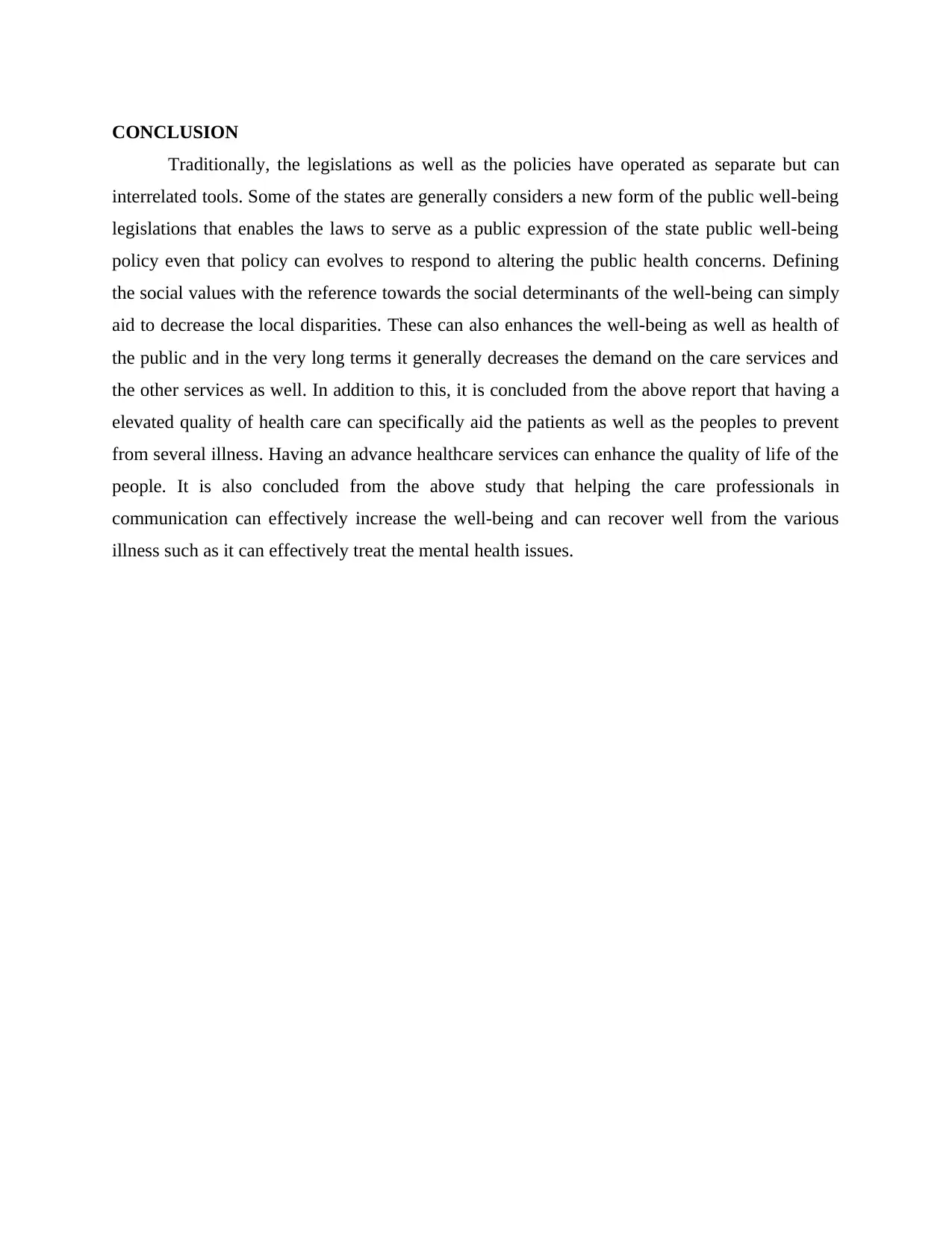
CONCLUSION
Traditionally, the legislations as well as the policies have operated as separate but can
interrelated tools. Some of the states are generally considers a new form of the public well-being
legislations that enables the laws to serve as a public expression of the state public well-being
policy even that policy can evolves to respond to altering the public health concerns. Defining
the social values with the reference towards the social determinants of the well-being can simply
aid to decrease the local disparities. These can also enhances the well-being as well as health of
the public and in the very long terms it generally decreases the demand on the care services and
the other services as well. In addition to this, it is concluded from the above report that having a
elevated quality of health care can specifically aid the patients as well as the peoples to prevent
from several illness. Having an advance healthcare services can enhance the quality of life of the
people. It is also concluded from the above study that helping the care professionals in
communication can effectively increase the well-being and can recover well from the various
illness such as it can effectively treat the mental health issues.
Traditionally, the legislations as well as the policies have operated as separate but can
interrelated tools. Some of the states are generally considers a new form of the public well-being
legislations that enables the laws to serve as a public expression of the state public well-being
policy even that policy can evolves to respond to altering the public health concerns. Defining
the social values with the reference towards the social determinants of the well-being can simply
aid to decrease the local disparities. These can also enhances the well-being as well as health of
the public and in the very long terms it generally decreases the demand on the care services and
the other services as well. In addition to this, it is concluded from the above report that having a
elevated quality of health care can specifically aid the patients as well as the peoples to prevent
from several illness. Having an advance healthcare services can enhance the quality of life of the
people. It is also concluded from the above study that helping the care professionals in
communication can effectively increase the well-being and can recover well from the various
illness such as it can effectively treat the mental health issues.
Paraphrase This Document
Need a fresh take? Get an instant paraphrase of this document with our AI Paraphraser
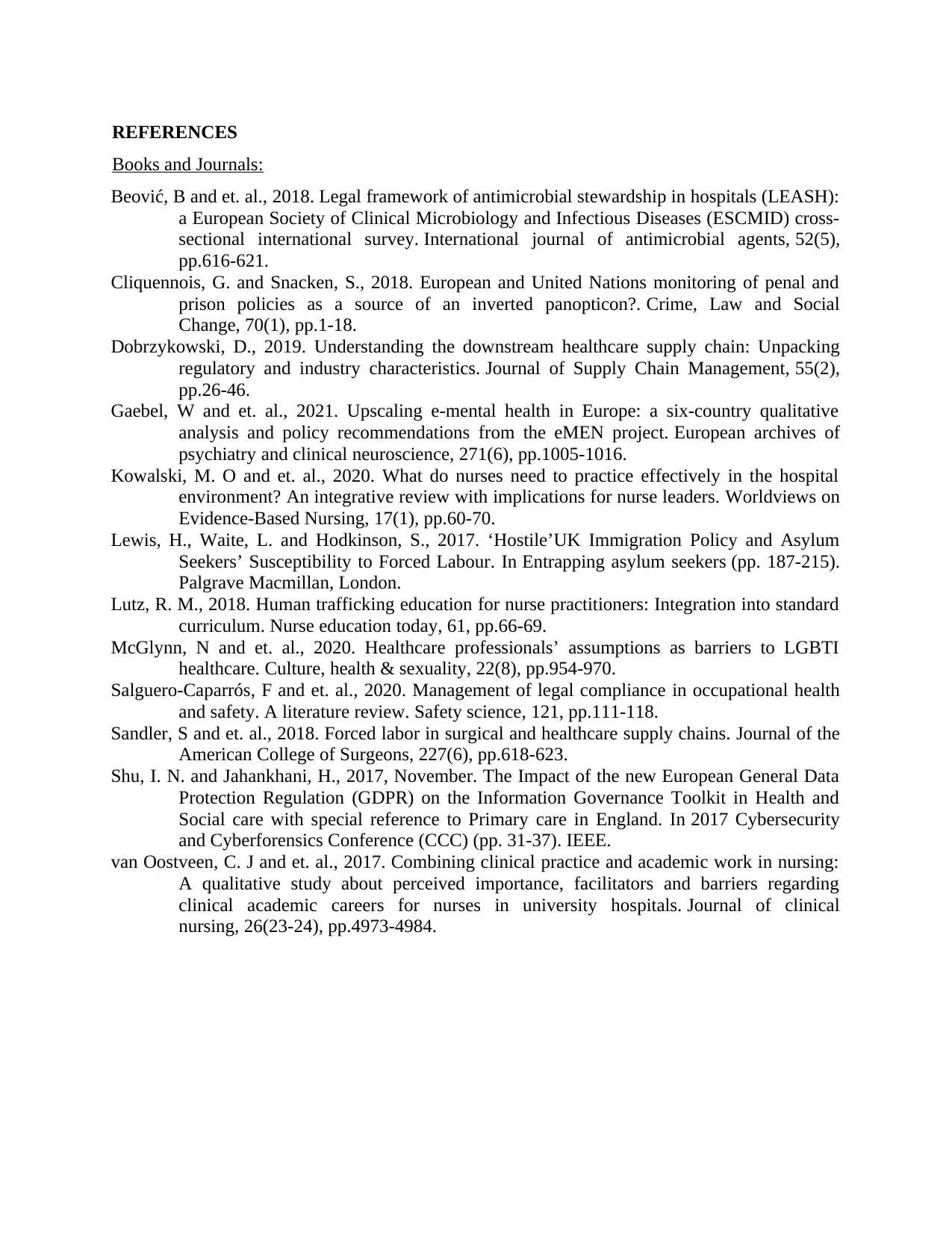
REFERENCES
Books and Journals:
Beović, B and et. al., 2018. Legal framework of antimicrobial stewardship in hospitals (LEASH):
a European Society of Clinical Microbiology and Infectious Diseases (ESCMID) cross-
sectional international survey. International journal of antimicrobial agents, 52(5),
pp.616-621.
Cliquennois, G. and Snacken, S., 2018. European and United Nations monitoring of penal and
prison policies as a source of an inverted panopticon?. Crime, Law and Social
Change, 70(1), pp.1-18.
Dobrzykowski, D., 2019. Understanding the downstream healthcare supply chain: Unpacking
regulatory and industry characteristics. Journal of Supply Chain Management, 55(2),
pp.26-46.
Gaebel, W and et. al., 2021. Upscaling e-mental health in Europe: a six-country qualitative
analysis and policy recommendations from the eMEN project. European archives of
psychiatry and clinical neuroscience, 271(6), pp.1005-1016.
Kowalski, M. O and et. al., 2020. What do nurses need to practice effectively in the hospital
environment? An integrative review with implications for nurse leaders. Worldviews on
Evidence‐Based Nursing, 17(1), pp.60-70.
Lewis, H., Waite, L. and Hodkinson, S., 2017. ‘Hostile’UK Immigration Policy and Asylum
Seekers’ Susceptibility to Forced Labour. In Entrapping asylum seekers (pp. 187-215).
Palgrave Macmillan, London.
Lutz, R. M., 2018. Human trafficking education for nurse practitioners: Integration into standard
curriculum. Nurse education today, 61, pp.66-69.
McGlynn, N and et. al., 2020. Healthcare professionals’ assumptions as barriers to LGBTI
healthcare. Culture, health & sexuality, 22(8), pp.954-970.
Salguero-Caparrós, F and et. al., 2020. Management of legal compliance in occupational health
and safety. A literature review. Safety science, 121, pp.111-118.
Sandler, S and et. al., 2018. Forced labor in surgical and healthcare supply chains. Journal of the
American College of Surgeons, 227(6), pp.618-623.
Shu, I. N. and Jahankhani, H., 2017, November. The Impact of the new European General Data
Protection Regulation (GDPR) on the Information Governance Toolkit in Health and
Social care with special reference to Primary care in England. In 2017 Cybersecurity
and Cyberforensics Conference (CCC) (pp. 31-37). IEEE.
van Oostveen, C. J and et. al., 2017. Combining clinical practice and academic work in nursing:
A qualitative study about perceived importance, facilitators and barriers regarding
clinical academic careers for nurses in university hospitals. Journal of clinical
nursing, 26(23-24), pp.4973-4984.
Books and Journals:
Beović, B and et. al., 2018. Legal framework of antimicrobial stewardship in hospitals (LEASH):
a European Society of Clinical Microbiology and Infectious Diseases (ESCMID) cross-
sectional international survey. International journal of antimicrobial agents, 52(5),
pp.616-621.
Cliquennois, G. and Snacken, S., 2018. European and United Nations monitoring of penal and
prison policies as a source of an inverted panopticon?. Crime, Law and Social
Change, 70(1), pp.1-18.
Dobrzykowski, D., 2019. Understanding the downstream healthcare supply chain: Unpacking
regulatory and industry characteristics. Journal of Supply Chain Management, 55(2),
pp.26-46.
Gaebel, W and et. al., 2021. Upscaling e-mental health in Europe: a six-country qualitative
analysis and policy recommendations from the eMEN project. European archives of
psychiatry and clinical neuroscience, 271(6), pp.1005-1016.
Kowalski, M. O and et. al., 2020. What do nurses need to practice effectively in the hospital
environment? An integrative review with implications for nurse leaders. Worldviews on
Evidence‐Based Nursing, 17(1), pp.60-70.
Lewis, H., Waite, L. and Hodkinson, S., 2017. ‘Hostile’UK Immigration Policy and Asylum
Seekers’ Susceptibility to Forced Labour. In Entrapping asylum seekers (pp. 187-215).
Palgrave Macmillan, London.
Lutz, R. M., 2018. Human trafficking education for nurse practitioners: Integration into standard
curriculum. Nurse education today, 61, pp.66-69.
McGlynn, N and et. al., 2020. Healthcare professionals’ assumptions as barriers to LGBTI
healthcare. Culture, health & sexuality, 22(8), pp.954-970.
Salguero-Caparrós, F and et. al., 2020. Management of legal compliance in occupational health
and safety. A literature review. Safety science, 121, pp.111-118.
Sandler, S and et. al., 2018. Forced labor in surgical and healthcare supply chains. Journal of the
American College of Surgeons, 227(6), pp.618-623.
Shu, I. N. and Jahankhani, H., 2017, November. The Impact of the new European General Data
Protection Regulation (GDPR) on the Information Governance Toolkit in Health and
Social care with special reference to Primary care in England. In 2017 Cybersecurity
and Cyberforensics Conference (CCC) (pp. 31-37). IEEE.
van Oostveen, C. J and et. al., 2017. Combining clinical practice and academic work in nursing:
A qualitative study about perceived importance, facilitators and barriers regarding
clinical academic careers for nurses in university hospitals. Journal of clinical
nursing, 26(23-24), pp.4973-4984.
1 out of 8
Related Documents
Your All-in-One AI-Powered Toolkit for Academic Success.
+13062052269
info@desklib.com
Available 24*7 on WhatsApp / Email
![[object Object]](/_next/static/media/star-bottom.7253800d.svg)
Unlock your academic potential
Copyright © 2020–2026 A2Z Services. All Rights Reserved. Developed and managed by ZUCOL.




